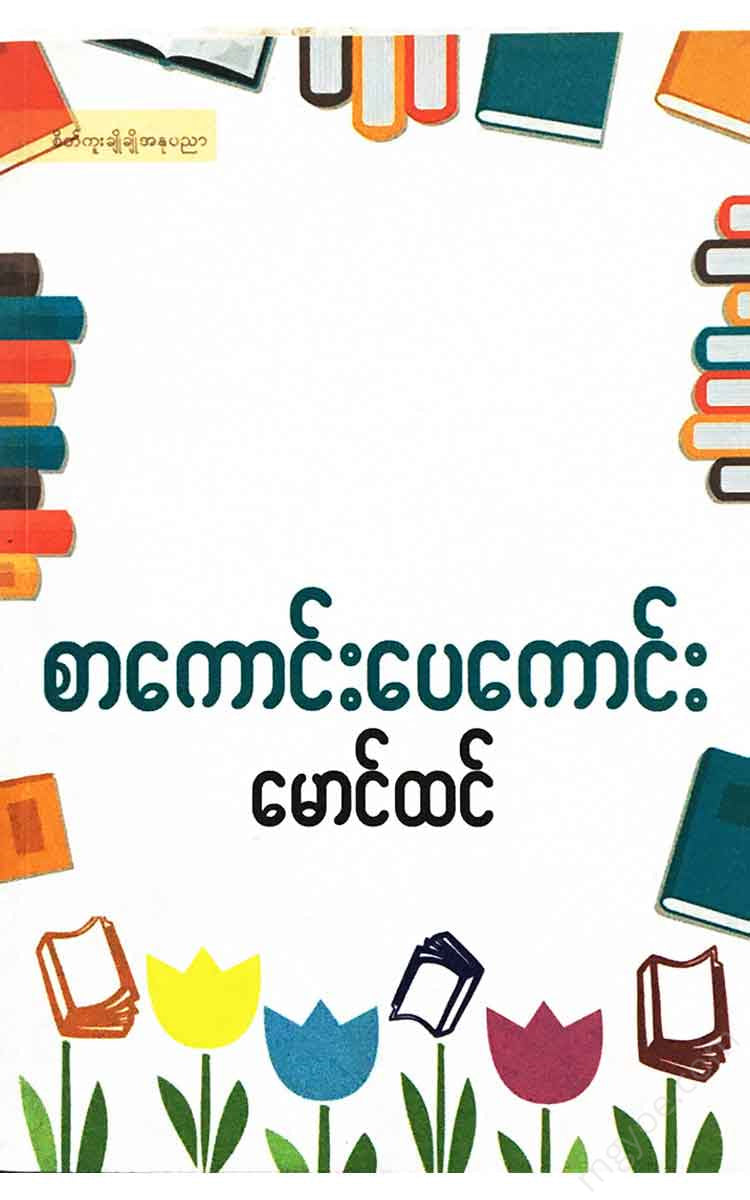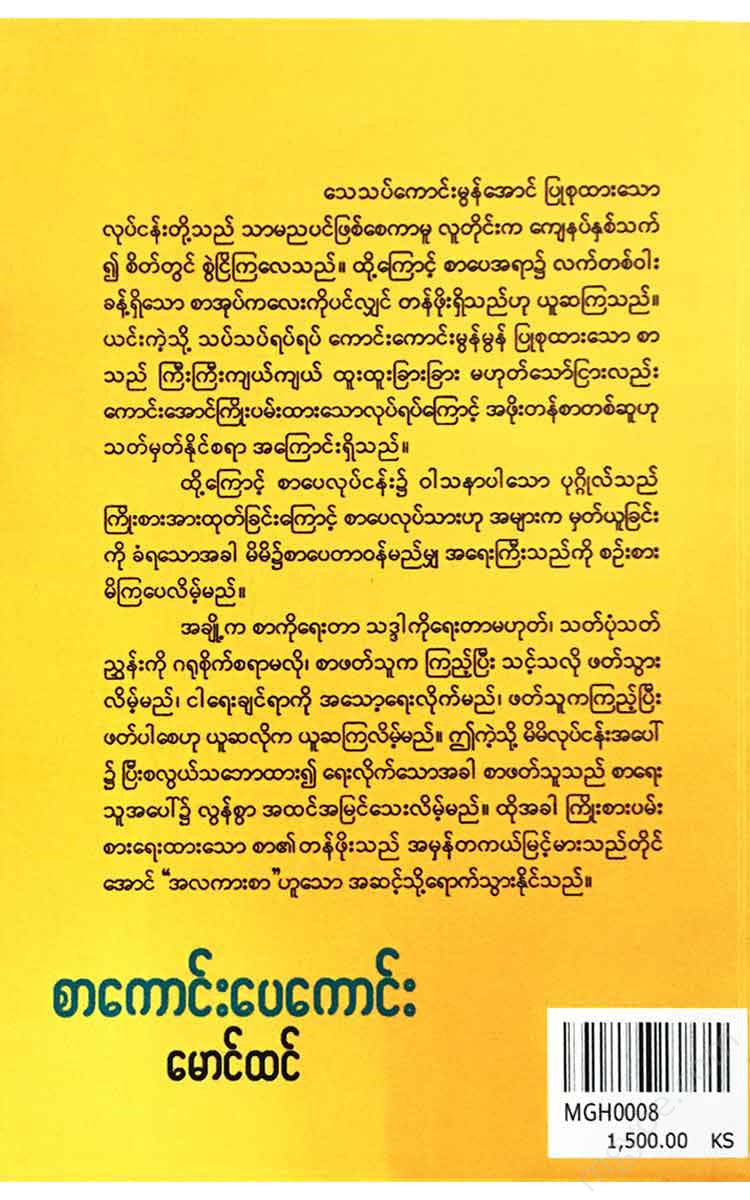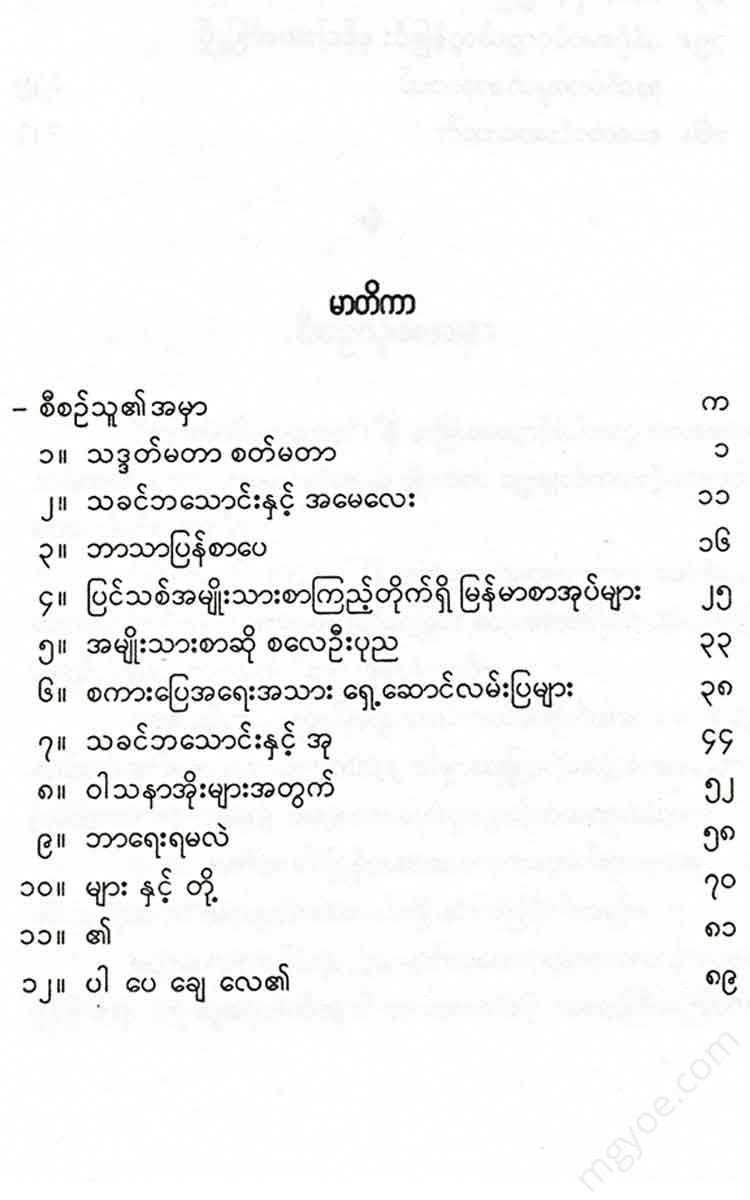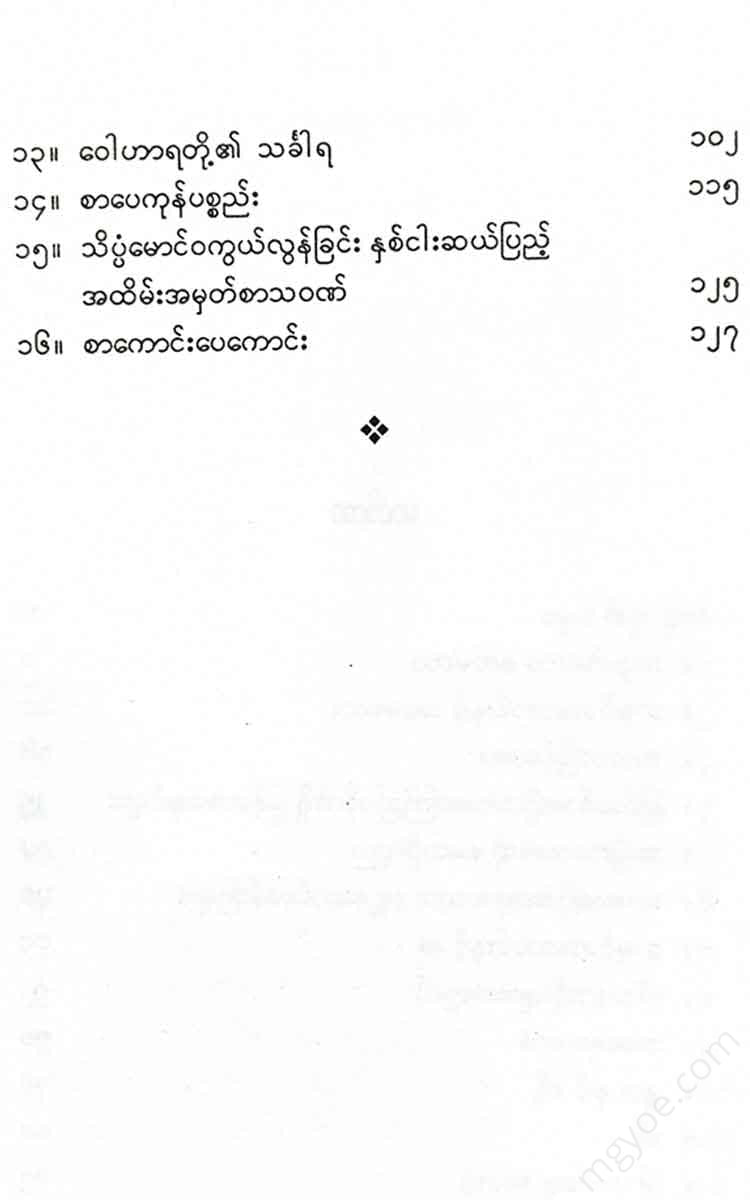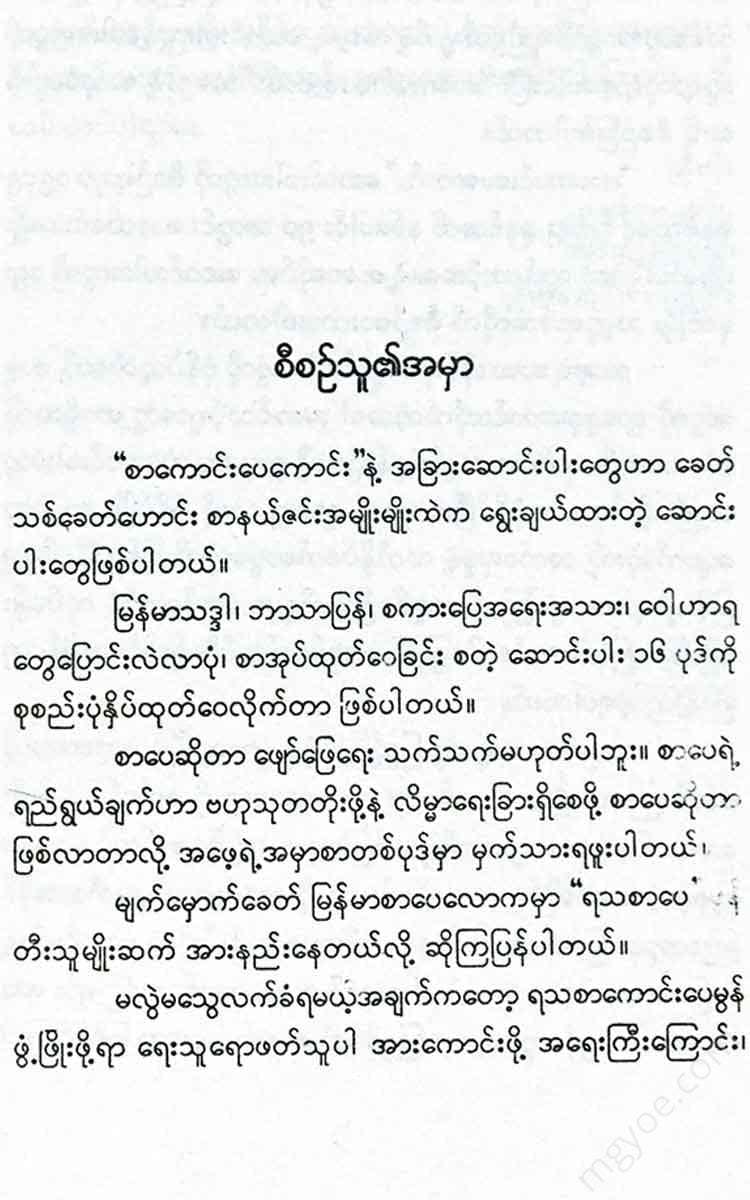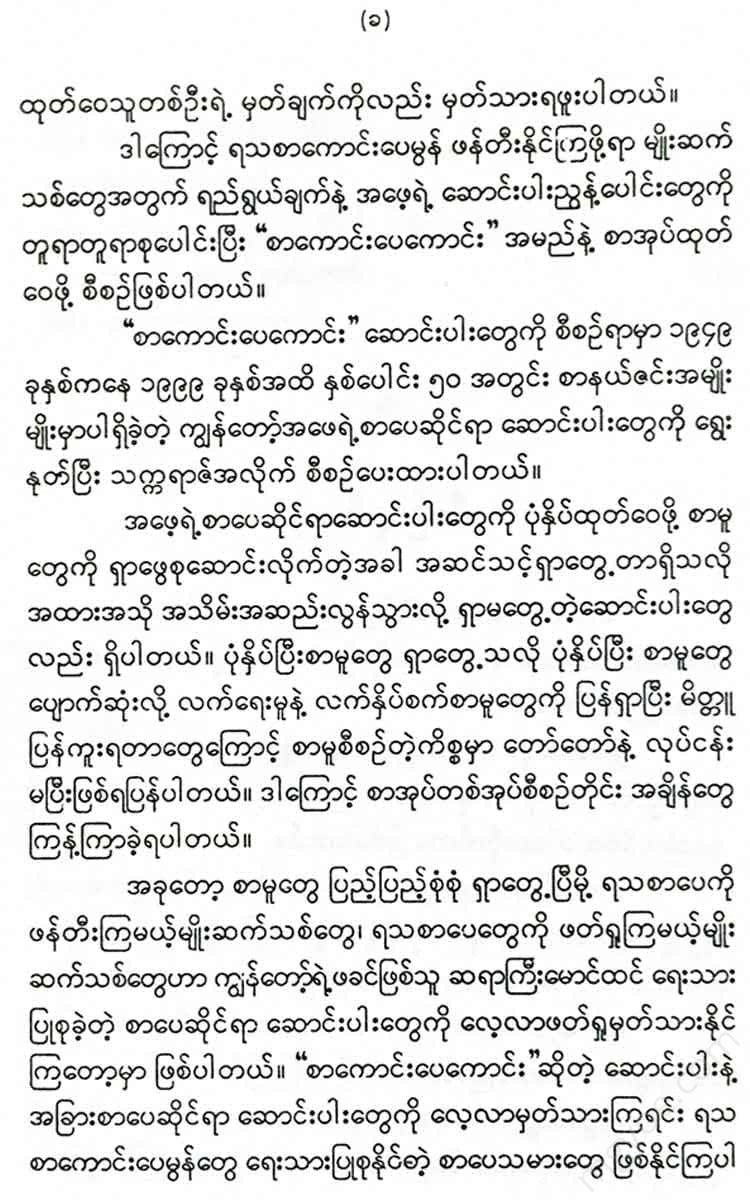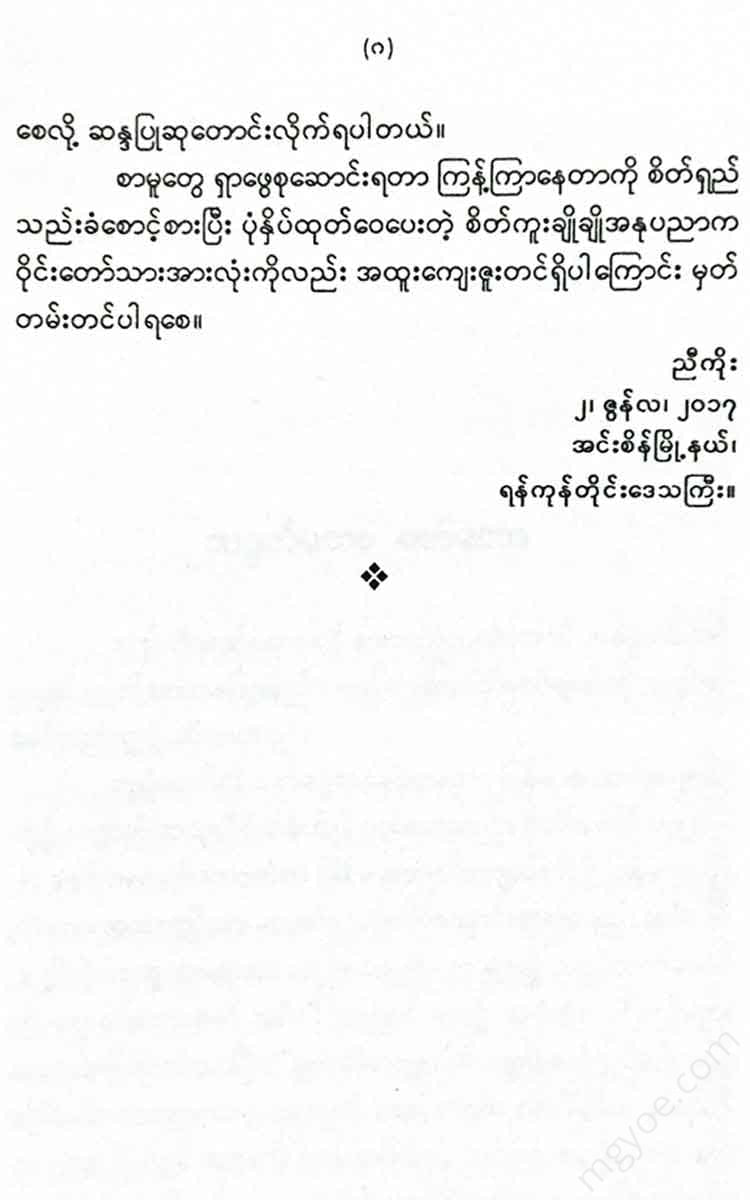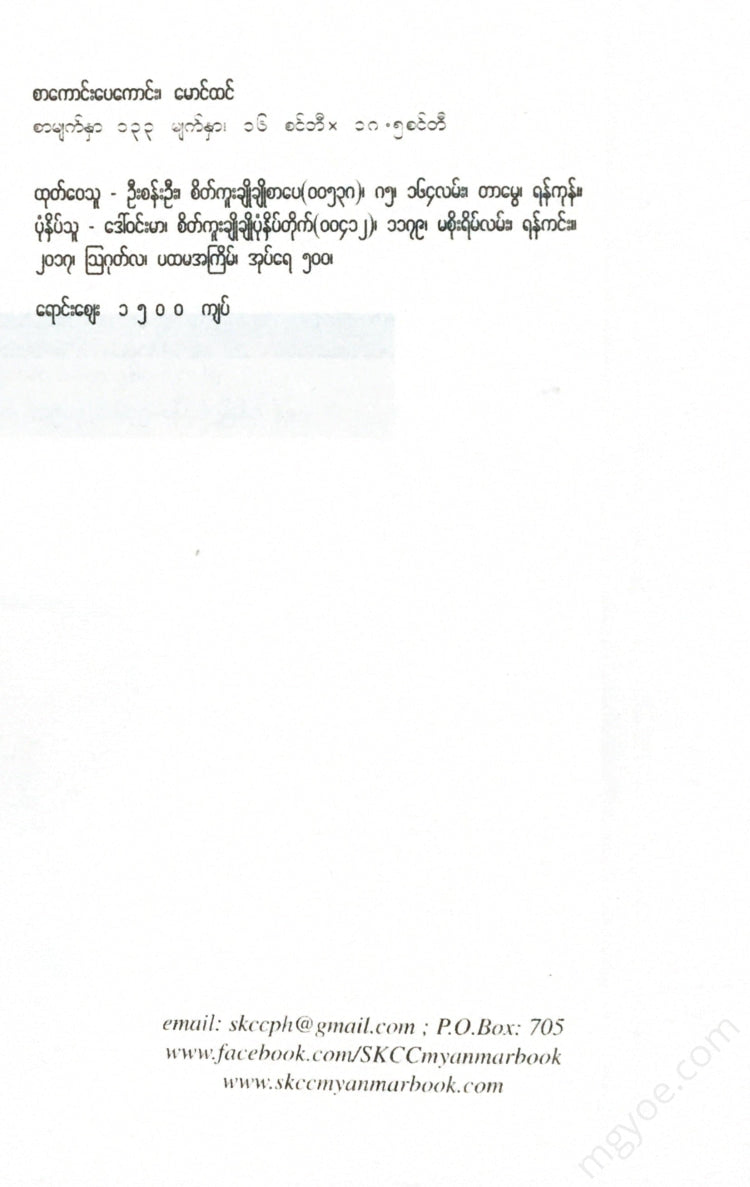စိတ်ကူးချိုချိုစာပေ
Maung Htin - Good writing, good poetry
Maung Htin - Good writing, good poetry
Couldn't load pickup availability
Saddhatmata Satmata
If we were to define the word grammar in an easy-to-understand way, we would say that the way people speak, the rules and regulations, are called grammar.
In the Burmese schools that we attended when we were young, grammar was taught with great care. I think that not only Burmese grammar was given importance in Burmese schools before 1926-27, but English grammar was also given special importance in English schools. From 1926-27, when the era came, the teaching methods in English schools changed a lot. The traditional teaching methods of “Nashville Grammar” were not suitable for ethnic children. Teachers considered it outdated, so instead of teaching grammar as grammar, they taught it in the readings and grammar lessons, and they taught it inconspicuously. //
Nowadays, however, students are taught how to write, read, and speak English, and this method is considered by scholars to be the fastest way to learn to read and speak English.
I am not an academic and do not want to criticize the merits and demerits of this method. However, when I talk to English literature lecturers and professors at universities, they tell me that modern university students do not know how to write or speak English grammatically.
I wonder if it is a reflection of the fact that English schools are gradually becoming less and less involved in grammar. Nowadays, grammar is almost non-existent in Burmese schools. It is taught only in very old-fashioned schools. Therefore, writers nowadays (those who have not studied in monasteries or Burmese schools) tend to write in Burmese with incorrect syntax, incorrect grammar, incorrect meaning, and incorrect grammar. Therefore, they cannot be blamed. Even this writer, when I reread my own writing last year, I regretfully found that no matter how carefully I wrote it, there were many grammatical errors. I don’t want to mention the spelling errors. To be honest, when I was in Burmese schools, I didn’t know if I would get a single spelling error or not. I fell behind in spelling. Since the day I started English school, I have been able to write well with spelling errors.
When we talk about grammar in this day and age, people who don't understand that grammar is the way of writing and speaking would probably laugh.
In Burmese, a complete sentence has the following order: doer, recipient, and action (kalta, kam, wa saka). In the sentence, “I beat my brother,” the doer is me. The recipient is my brother. The word that indicates the act of beating is “tay.” Now, with the theme of the new era and the theme of new literature, many writers are imitating English. When they imitate, they are not imitating the ideas in English literature. They are imitating English language, English writing, and English grammar. The public does not understand all such writings well. The writers do not understand each other well. Sometimes the writers themselves do not know what they mean.
For example, let's rewrite the short sentence above in English.
I am writing to you, Maung Ba. Is it possible to write like that and become modern literature? However, the literature that is happening now is far from being the popular literature that Thein Pe Myint envisioned. It is not even a simple Burmese literature. Why? Because some of the so-called writers have a poor foundation in Burmese.
If you blame them for their poor foundation, it is not right. We do not have a dictionary in Burmese. There are dictionaries with different philosophies. But the public does not follow those books. Grammar books are also a far cry. All grammar books are just Pali-style grammar books.
However, during and after the war, dictionaries are being compiled, which is encouraging. Some books that have been carefully compiled and referenced, and which are encouraging, are also being published. However, there is still no grammar book to show for it.
When I was young, I used to study Saw Chin Htin's Burmese grammar. However, his grammar was a language where each letter had a different meaning, and he used the rules of the language to change the meaning of each letter by adding a suffix. Just as a Burmese person cannot be called Mr. Mwai, Saw Chin Htin's grammar cannot be Burmese grammar in any way, and his grammar has disappeared from the classrooms.
There were Myanmar grammar books in the past. However, those books were not just grammar books. They were also...
The most common are the poems, the answers to the verses, and the appendices. Some scholars have written about grammar and the history of words in their own way. Sometimes the so-called scholars are also quite opinionated. Therefore, their opinions remain as the opinions of one person and have not developed enough to be accepted and followed by later people as rules and regulations.
Burmese is a monosyllabic language, meaning that one word has one meaning. These words can be combined and arranged together to form a meaningful sentence. Consider the word “I beat my brother.” “Slave” is a word that refers to oneself as “a servant and humbles oneself.” “Taw” is an adjective that indicates that one is a servant of the lord, a royal prince. “ကိ” is a noun that indicates the doer. “Maung” is a polite word that refers to the person who is called “Ba Maung.” Ba is Maung’s real name. Ko is a noun that indicates being hit. Rait is a word that indicates hitting with something.
'This is the meaning of the word 'Kaltawasaka'. In Burmese, the word 'Aham' cannot be changed grammatically to become 'May Ma Ma' like in Pali. In Burmese, the word 'I' cannot be changed grammatically to become 'My.Me'. Beat//
Although it is possible to use English grammar to make words like Beating.Beater.Beaten , it is impossible to expand the word 'write' with Burmese grammar to 'write' like the English word 'write'.
I will explain the superstition of the ancient Burmese grammarians. Because Sanskrit and Pali were popular, in the eyes of the ancients, it was believed that any Burmese language was directly derived from Sanskrit and Pali. The preposition “က” in verbs such as မြိုင်းရာ
"This is the cessation of knowledge, this is the cessation of knowledge." "Sa" is attached like this, this is. The Buddha's essence, the essence of restraint, the essence of prohibition... This is called the cessation of ignorance.
The monk who opened this grammar book was Okpho Sayadaw. The words "विबाक्त रत्वे सांग्राया निर्ये" were added to the last part of the "Swetaw Shaung Yatu" (published by Hanthawaddy in 1897).
For the bricklayer, no Burmese word comes from the Pali sphere. For example, the word "kya" comes from the plural form, meaning "plural". The word "kya" is derived from the plural form, meaning "we". The word "to" also comes from the plural form.
In the plural, the word "ba" is omitted, in the plural, the word "hu" is omitted, and in the plural, the word "u" is omitted. This is a very clear grammar. It makes one wonder whether Myanmar grammar books have no room for compromise due to such self-contradictions.
The monk Okpho Sayadaw is able to express the meaning of Burmese prepositions such as ເຄື່ອງ ,
During the time of U Po Sein Gyi, he conducted research that provided much evidence for Burmese grammar. He often quoted Kyaw Aung San Tha.
In some places, U Pho Sein is not as superstitious as Okpho Sayadaw. He is logical and thoughtful. Some modern scholars do not like his ideas very much. However, U Pho Sein was the first to lay the foundation of Burmese grammar. I have noticed that U Pho Sein's research and explorations are left in the hands of his heirs. They should be published.
The first drafters are usually the ones who have to work their way through the forest of mistakes. One wonders if there is no need to reconcile the Burmese grammar books due to the gradual changes.
The monk Okpho Sayadaw is able to express the meaning of Burmese prepositions such as ເຄື່ອງ ,
During the time of U Po Sein Gyi, he conducted research that provided much evidence for Burmese grammar. He often quoted Kyaw Aung San Tha.
In some places, U Pho Sein is not as superstitious as Okpho Sayadaw. He is logical and thoughtful. Some modern scholars do not like his ideas very much. However, U Pho Sein was the first to lay the foundation of Burmese grammar. I have noticed that U Pho Sein's research and explorations are left in the hands of his heirs. They should be published.
First of all, those who are the first to make mistakes are usually the ones who have to work hard. They can gradually correct the mistakes and get them to the right place. Nowadays, there is no grammar book to refer to, so they write Burmese as they please. They know that someone else's writing is wrong, but they don't know why it is wrong. They can't bring the wrong to the right place. Maung Ba went to the market. Maung Ba went to the market. Maung Ba went to the market. Maung Ba went to the market. There are expressions like "Maung Ba went to the market" and "Maung Ba went to the market" that have their own meanings and meanings. However, nowadays, there are only a few people who use them correctly. Some writers write in their own style, writing, and writing until they lose their originality. Some writing experts write so that they cannot distinguish between Calcutta and Karma. That style of writing is the way of being arrested while being a lawyer.
There was a fight in a village. The one who beat him was a common chicken thief. The victim was an old man. The old man had a two-inch scar on his head. So the old man went to the ghat and got it.
The clerk looked at the old man's head and asked.
"What's wrong, old man?"
The grandfather answered.
"I'm just a hitter"
Even so, the old man was arrested. The old man was so shy that he couldn't say anything. But he didn't want to be arrested.
Therefore
" What do I have to do with the swara?"
"He asked the clerk and the clerk."
The clerk replied, "Oh, you hit Sawa and you got arrested."
"No. You said you beat me up," the old man complained angrily, but the clerk understood and let the old man go.
Well... I can only write. I don't know if my writing is grammatically correct. Is it like "I'm just writing"?
Blood Drinking Magazine,
No. 46, November, 1949.
